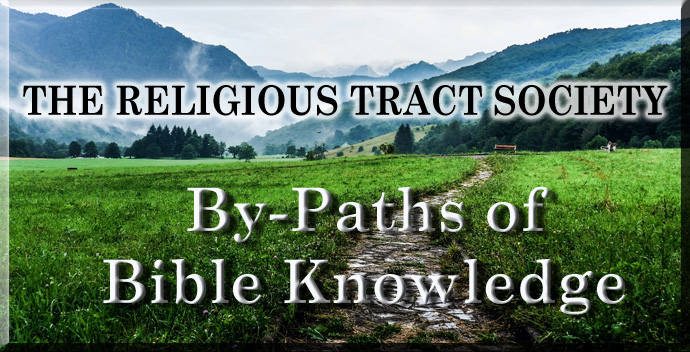
By-Paths of Bible Knowledge
Book # 5 - Galilee in the Time of Christ
Rev. Selah Merrill, D.D.
Chapter 15
|
THE PROPHETS, JUDGES, AND OTHER FAMOUS MEN OF GALILEE. IN this connection a brief notice must be taken of the famous persons whose birthplace, or home, was in this northern province. We may be obliged here to go beyond the strict limits of our period, in order to answer the flippant and prejudiced remark: ' Out of Galilee ariseth no prophet1.' — a remark which should never have been believed at all, but which, being accepted without reflection, has had much influence in shaping the common notion of the character of Galilee. In the time of the Judges, Naphtali furnished Barak, the victor over the Canaanites, with whom should be mentioned Deborah, 'a prophetess' the "mother in Israel ' whose presence and words inspired those bold sons of the north to heroic deeds, and also Jael, 'the wife of Heber the Kenite,' a heroine of that bloody day2. Zebulun furnished Ibzan, who judged Israel seven years, and after him Elon, who judged Israel for ten years. Issachar likewise furnished Tola, who judged Israel twenty-three years3. Still later this country sent forth a number of prophets, whose memories were always cherished by the people, and whose tombs were built and guarded by a grateful posterity with pious care. If it is doubtful whether Elijah was born in Galilee, yet the scene of his labours was chiefly this northern region, and the home of his successor Elisha was in the tribe of Issachar. Hosea also belonged to Issachar; Jonah, the son of Amittai, came from Gath Hepher in Zebulun; and the prophet Nahum from Elkosh in Galilee. This has been disputed; still many able scholars hold the view here expressed4. In the Assyrian captivity, under Shalmaneser, appears Tobit from Naphtali. He was l a godly man,' and 'in the account of him we have a very instructive picture both of his home and of his times.' Alexander, the first renowned Jewish philosopher in Alexandria, — a peripatetic and the forerunner of Philo, — is supposed by some to have been born in Paneas. This, however, is not certainly established. Nitai, B.C. 140-110, a learned doctor of the Mishna, came from Arbela. His rule of life was: ' Avoid a bad neighbour; associate not with sinners; and do not forget a future recompense.' Two other Mishna doctors also came from this region, and King Alexander Jannaeus, son of Hyrcanus, calls Galilee his fatherland. In Christ's time, Anna the prophetess belonged to Asher, and, we may mention again, the missionary Eleazar and Judas the Galilean zealot, and with the latter his sons, James and Simon, who were crucified, and Manahem. who was killed in Jerusalem. Perhaps Hezekiah, the brigand chief whom Herod slew, and his son Judas, who on Herod's death raised a revolt, took Sepphoris, and was captured only after a hard struggle, may be mentioned as showing, though outlaws, the mettle of the Galileans. There was also Eleazar, the son of Jairus, a kinsman of Manahem and a descendant of Judas the zealot, who was the founder of the sect of the Galileans. This Eleazar boasted of himself and his companions: ' We were the first of all to revolt,' against the Romans, 'and we are the last in arms against them'; 'We determined to serve as master no one but God, and the time has come for us to show the sincerity of our words by our actions'; and they all perished then and there, in the bloody slaughter at Masada. Galilee had Herod the Great for governor, afterwards Antipas, the ablest of his sons, and still later, as military governor, Josephus. At that time flourished the famous John of Gischala; Silas, the governor of Tiberias by Josephus' appointment, and Joshua, in authority there, but opposed to Josephus; Julius Capellus, leader of the most respectable party in Tiberias, and his associates, namely, Herod son of Miarus, Herod son of Gamalus, Compsus and Crispus — these two the sons of Compsus; also, Pistus and his son Justus — the latter a friend of Greek learning, and the author of a history in Greek of his own times, but the implacable enemy of Josephus. There was in the early Church a tradition that the parents of the Apostle Paul came from Gischala in Galilee. It is easy to reject the tradition, but quite difficult to see how such a tradition should become attached to this particular place; somebody at some time must have believed it, and perhaps with reasons. We might, perhaps, include Nathanael of Cana of Galilee; Peter, as a representative man of Galilee; Zebedee and his two sons, James and John — a family of wealth; Andrew and Philip, of Bethsaida in Galilee; Joseph and Mary; James, the brother of Christ and the first Bishop of Jerusalem; also Salome, sister of Mary and wife of Zebedee. And, if we were to look beyond the destruction of Jerusalem, we should find Galilee the abode of many famous and learned men, and the seat of flourishing schools. From the second to the sixth century it was the centre of Jewish learning in Palestine.
|
|
 |
 |
|
1) John vii. 52. 2) Judges iv. 3) Judges x. I, 2; xii. 8, 11. 4) Smith's Bible Dict., I. p. 724, art. 'Elkosh.'
|
|
-
Site Navigation
 Home
Home What's New
What's New Bible
Bible Photos
Photos Hiking
Hiking E-Books
E-Books Genealogy
Genealogy Profile
Free Plug-ins You May Need
Profile
Free Plug-ins You May Need
 Get Java
Get Java.png) Get Flash
Get Flash Get 7-Zip
Get 7-Zip Get Acrobat Reader
Get Acrobat Reader Get TheWORD
Get TheWORD